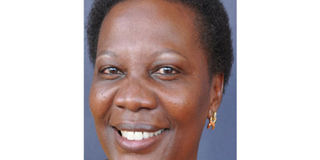Government working to make power tariffs friendly, says minister

Energy minister Irene Muloni
Kampala- Despite increased generation, electricity tariffs have remained high thus leading to low access by consumers.
Electricity generation capacity, according to statistics from Electricity Regulatory Authority (ERA), has grown 947MW (MW) from 300 MW in 2002, indicating a 68 per cent MW increase.
Currently, the cost of a unit of power for household, salons, shops and kiosks is Shs685. This, according to analysts and consumers, is still very high for an average Ugandan who lives on less than two dollars (Shs6,400) a day.
To address this, government has promised to make power prices affordable in addition to facilitate free connections in priority areas.
In a recent interview with Daily Monitor, Energy minister Irene Muloni, said: “Government is working with various stakeholders to ensure that the power tariffs are friendly and affordable especially for industrial consumers.”
Further mitigating on the high prices, Ms Muloni said government approved a power sector reform strategy in 1999 that called for developing Uganda’s hydro power resources through Independent Power Producers (IPPs) and adopting a commercially-oriented approach to increase power access and improve performance.
Because of this, several tariff adjustments and associated revisions to the tariff-setting formula have considerably improved the sector’s financial viability.
“The end-user tariffs are set by the Electricity Regulatory Authority (ERA) based on revenue requirements of the generation, transmission, and distribution companies and the terms of various contracts with the private generation and distribution companies,” Ms Muloni explained.
According to Mr Henry Richard Kimera, the executive secretary of the Consumer Education Trust - a consumer protection organisation, consumers have continued to get a raw deal.
“We the consumers need to see good economic stability which will attract investment and then maybe the price of electricity will eventually go down. Without that, we are going to continue paying high tariffs,” Mr Kimera said.
Status of consumption
Uganda’s electricity consumption, an important indicator of economic activity, has also registered growth in the past two years as demand for energy services grows.
Power sales to final consumers grew by 4.2 per cent to 2,607.911 Giga-Watt hours (GWh), according to figures from the Energy and Mineral Sector Performance Report 2016/17.
Mr James Baanabe, the acting director Energy Resources Department in the ministry of Energy, said: “Access to electricity has also grown from the baseline statistics of 17 per cent in Financial Year (FY) 2014/15 to the current parameter of 22 per cent in FY 2016/17.”




